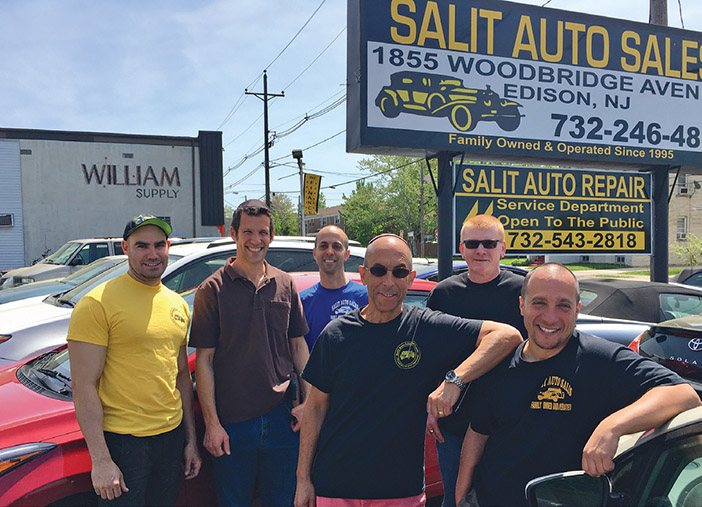

One of the ways a frum-owned business can serve as a role model for Yiddishkeit is when it goes “above and beyond” accepted practices. Salit Auto Sales in Edison provides a wonderful example.
The used-car dealership, a Middlesex County business for over 20 years, is owned and operated by one family: father Steve Salit, sons Jerry and Alan and son-in-law/brother-in-law Michael Kornfeld. They take pride in their commitment to the community and are active in their shul, Congregation Ahavas Achim in Highland Park.
By the standards of the industry, they would have been well within their rights to keep the deposit of a woman who failed to come forward and pay the remaining balance on her desired car, a 2006 Chrysler Sebring Convertible. After all, she dropped out of touch for nearly a year—despite the dealership’s best efforts to contact her with calls and registered letters.
The costs over many months of storing the car on their lot, and the lost sales opportunities, are widely recognized as mitigating factors that forfeit a customer’s forgotten deposit, even one as large as this customer’s, which she’d paid in small increments over a few months (before she disappeared), until the deposit had grown to nearly half the cost of the car!
When the woman finally did show up to inquire about her car, after a year of being completely out of touch, the sales staff told her that that particular car had been sold months earlier to make space for new inventory. But Steve, Jerry, Alan and Mikey listened to her story of why she dropped out of touch, recognized her unusually large deposit and took another course.
Given all the costs Salit Auto Sales had accrued as they waited and tried to contact her, they would not refund the money outright, but they would apply the full amount to the purchase of another car at the dealership. The woman took them up on the generous offer and promptly ended up purchasing…another 2006 Chrysler Sebring Convertible. Only this one was a different color.
Salit Auto Sales’ high standards resonate well with its customers. Malcolm Greenberg, a member of Congregation Etz Ahaim of Highland Park, said, “Over the past six years, I have purchased at least six vehicles from Salit Auto Sales and will be looking for my next one over the next few weeks. The crew at Salit Auto has been absolutely trustworthy and a reliable resource for my vehicular needs. They are professional, educated and friendly, and have helped my family with buying and maintaining our vehicles.”
Another way you can learn about the character of a business owner is to see what makes them stop what they’re doing, even though time is money, to seek more information about something not directly business-related. For Josh Ostrin, it was a bird’s nest in a gutter.
Ostrin is the owner/operator of AAMATEX Power Washing, which serves residential and commercial clients in Middlesex and Monmouth counties. Ostrin has owned the business for over 25 years and devotes a lot of time to it, when he’s not volunteering at the same Congregation Ahavas Achim (he’s the incoming president) to which the Salits belong, and also at Rabbi Pesach Raymon Yeshiva in Edison (where he’s coach of the boys and girls basketball teams).
One day in the mid-1990s, Ostrin was about to power wash a home in East Brunswick when he climbed a ladder to check out the quality of the roof. On the way up he noticed a peace dove sitting on a nest of eggs in the gutter. Josh remembered something he had just learned in a recent Halacha class, led by Moshe Feuer of the Agudath Israel of Edison, and decided that he had to consult with Moshe right away.
The Halacha Josh had learned was about the mitzvah of Shluach HaKon, sending away a mother bird before claiming one of its eggs. Moshe told the class that the mitzvah was a segulah (good sign) for a shidduch. Josh recalls thinking at the time: “Yeah, how often will this situation come up?” Yet days later, it appeared that the potential mitzvah was right in front of him.
Josh called Moshe at work and insisted that the secretary summon him to the phone. Josh told Moshe the situation, to which Moshe responded that he would consult with his rav. It turned out that the situation is more rare and more nuanced than many other mitzvot, so Moshe’s rav had to call his rav in Rhode Island, who ultimately called his rav in Israel.
After some waiting, Josh learned that the final decision was that because he was not on his own property, this was not his mitzvah to perform. He went back to work and, at the next meeting of the Halacha class, told the guys what had happened. One of them said, “You were ready to perform the mitzvah; you should get credit.”
Weeks later, that same classmate suggested a shidduch to Josh and he went on a first date with the woman that summer. The shidduch must have been a good one because that woman, Leslie, and Josh married in November 1997 and have since raised a family of four children. And maybe they have a not-so-obscure mitzvah to credit for their success in finding each other.
By Harry Glazer










